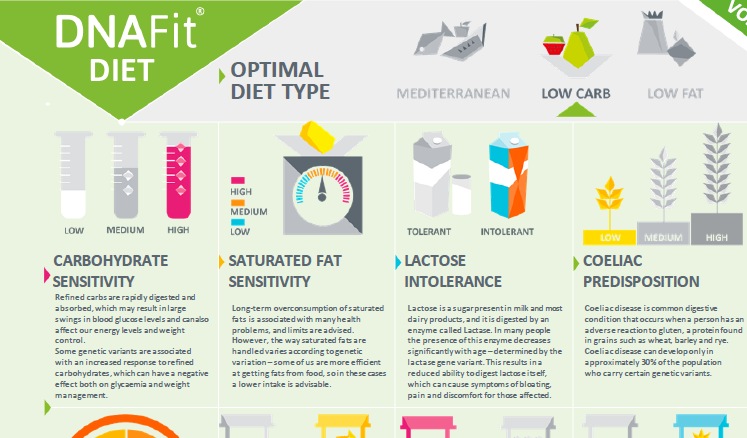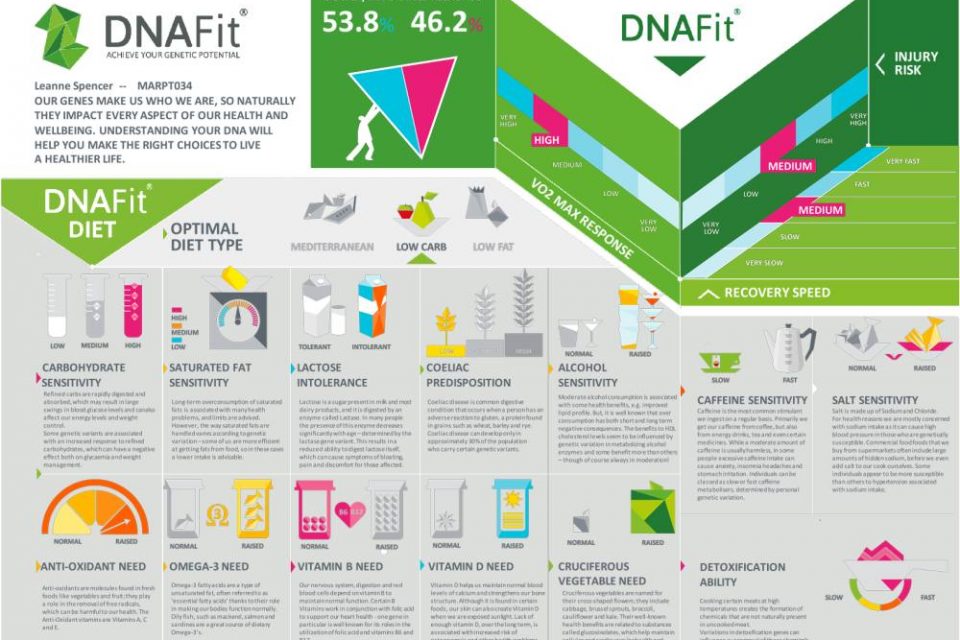
The calories in versus calories out approach to dieting is outdated, ineffective and any potential short-term gains are soon overshadowed by frustration as the weight piles back on. What we know about weight gain and weight loss is far more scientific, and there’s an appreciation that what works for you, might not work for me. We’re all different, and respond to foods and exercise in different ways, and understanding this holds the key to successful long-term weight loss.
For the past few years, there have been tests on the market that analyse your DNA. These tests look for markers that relate to certain aspects of fitness and nutrition, and when applied against an algorithm, result in reports that indicate what type of diet is best suited to you based on your unique genes. It’s very clever stuff, and removes all the guesswork around your health, fitness and nutrition. I’ve written extensively about the tests in my book Remove the Guesswork, and I believe that in a few years’ time it will be standard for recreational athletes and anyone looking to manage their weight to take a DNA test.
We ask clients to take the DNA test at the start of our programs. It saves time and money because we’re not making educated guesses about what type of nutrition program to recommend. Most clients come to us for weight management – usually weight loss. We’ve helped clients lose as much as 32kg, and a lot of this is down to the results of the DNA test. Clients find it easier to comply with the recommendations because it’s not based on what worked for their friends, a colleague or a celebrity, but on their unique genes. If they follow the advice, it will work. It’s working with your genes, not against them.
I took the test about two years ago, and I’ve made several modifications to my diet that have resulted in significant health benefits (and I’m 3.5 stone lighter than I was). I’m highly sensitive to carbohydrates, which means not only will I store excess calories from carbs as fat, but I also respond very quickly to carbs, which results in a spike of energy followed by a rapid slump. This isn’t good for energy levels, weight management or blood sugar regulation. I’m also highly sensitive to saturated fat, so I keep this to a minimum also. The other key factors for weight management are the sensitivities to gluten and lactose. One client we worked with had belly fat that stubbornly refused to shift, even with exercise. She had self-diagnosed it as a sensitivity to lactose, but after taking the DNA test, she discovered that it was a gluten intolerance instead. She cut out gluten for two weeks, and the belly fat disappeared.
Other aspects of the nutrition report include requirements for vitamins B6, B12 and D3, and sensitivity to salt, caffeine and alcohol. It also provides your requirements for anti-oxidants and cruciferous vegetables. Another reason why DNA testing is so efficacious, is that it’s not a weight loss tool or service, it’s your genetic blueprint for good health. I blogged last week about the body finding it’s natural set point, and eating a diet that is suited to your body, full of vitamins and minerals, will help you find that set point for yourself. Weight management is as much about consistency as the food and drink itself.
Personalised health, fitness and nutrition is the future. Understanding how your body responds to certain foods, and what impact that has on your energy, weight and wellbeing, will be critical to successful weight management.
Leanne Spencer is an entrepreneur, coach, TEDx Speaker, author of Remove the Guesswork: the highly personalised approach to health, fitness and nutrition that puts you first, and founder of Bodyshot Performance Limited. Bodyshot is a health and fitness consultancy that helps busy professionals get more energy by removing the guesswork around their health, fitness and nutrition. Visit www.bodyshotperformance.com or send an email to info@bodyshotperformance.com to register your interest in our services. Connect with us on Facebook, Instagram and Twitter.


